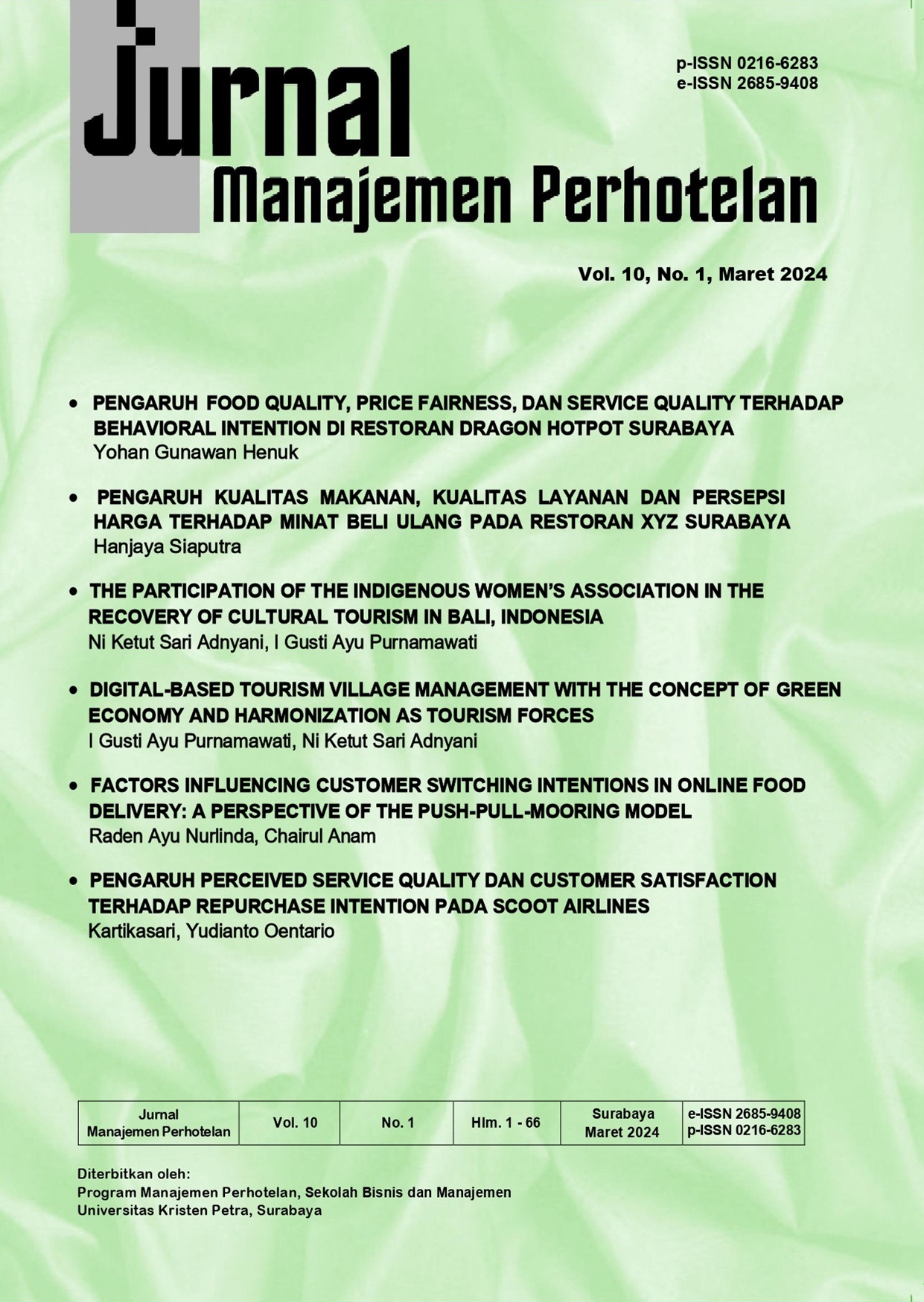Digital-Based Tourism Village Management with The Concept of Green Economy and Harmonization as Tourism Forces
DOI:
https://doi.org/10.9744/jmp.10.1.35-42Keywords:
digital village, green economy, tourism villageAbstract
Digital Village is a program concept that implements government service systems, community services, and community empowerment based on information technology. Blimbingsari is a Tourism Village where the management of tourism is community-based. The type of research used in this research is qualitative research. This study aimed to determine the management of digital-based tourism villages with the concept of green economy in increasing the tourist attraction of Blimbingsari village. Blimbingsari Tourism Village also has its website, which anyone can access anywhere. On the website, the profile of Blimbingsari Village is listed, followed by what tourist attractions are offered and many more things we can access. From several aspects related to the implementation of the green economy, several things have not been able to be implemented by the Blimbingsari Tourism Village to uphold the concept of the Green Economy and harmonization. It needs further attention from related parties so that all these aspects can be fulfilled, and Blimbingsari Tourism Village can fully become a digital-based tourism village with a green economy concept, attract more tourists, and harmonize as a tourism force.
References
Agusta, Y. (2023). Managing the development of a sustainable digital village. Sustainability, 15(9), 7575. https://doi.org/10.3390/su15097575
Ali, E. B., Anufriev, V. P., & Amfo, B. (2021). Green economy implementation in Ghana as a road map for a sustainable development drive: A review. Scientific African, 12(e00756), 1–17. https://doi. org/10.1016/j.sciaf.2021.e00756
Astawa, I. N. W., & Utama, M. S. (2020). Village fund mangement strategy as a factor in good governance implementation. International Journal of Business, Economics and Law, 23(1), 111–117.
Chiwaridzo, O. T., & Masengu, R. (2023). The impact of social media branding and technology adoption on green tourism: the role of tourist behavior as a mediator in developing countries post-COVID-19—context of Zimbabwe. Future Business Journal, 9(63), 1–14. https://doi.org/10.1186/s43093-023-00249-6
Dionisio, M., Junior, S. J. de S., Paula, F., & Pellanda, P. C. (2023). The role of digital social innovations to address SDGs: A systematic review. Environment, Development and Sustainability. https://doi. org/10.1007/s10668-023-03038-x
Gramkow, C. (2020). Green fiscal policies: An armoury of instruments to recover growth sustainably (Studies an). United Nations publication.
Javaid, M., Haleem, A., Singh, R. P., & Suman, R. (2021). Substantial capabilities of robotics in enhancing industry 4.0 implementation. Cognitive Robotics, 1, 58–75. https://doi.org/10.1016/j.cogr.2021.06.001
Junaedi, I. W. R., & Waruwu, D. (2020). Economic transformation: The new spiritual leadership model in Blimbingsari Village Jembrana Bali. International Journal of Economics Development Research, 1(1), 19–35.
Khalid, S., Ahmad, M. S., Ramayah, T., Hwang, J., & Kim, I. (2019). Community empowerment and sustainable tourism development: the mediating role of community support for tourism. Sustainability, 11(22), 6248. https://doi.org/10.3390/su11226248
Khan, I. S., Ahmad, M. O., & Majava, J. (2021). Industry 4.0 and sustainable development: A systematic mapping of triple bottom line, Circular Economy and Sustainable Business Models perspectives. Journal of Cleaner Production, 297(126655), 1–16. https://doi.org/10.1016/j.jclepro.2021.126655
Martins, F. S., Cunha, J. A. C. da, & Serra, F. A. R. (2018). Secondary data in research – uses and opportunities. IberoamericanJournal of Strategic Management (IJSM), 17(4), 1–4. https://doi.org/ 10.5585/ijsm.v17i4.2723
Mensah, J., & Casadevall, S. R. (2019). Sustainable development: Meaning, history, principles, pillars, and implications for human action: Literature review. Cogent Social Sciences, 5(1), 1–21. https://doi.org/10.1080/23311886.2019.1653531
Moallemi, E. A., Malekpour, S., Hadjikakou, M., Raven, R., Szetey, K., Ningrum, D., Dhiaulhaq, A., & Bryan, B. A. (2020). Achieving the Sustainable Development Goals requires transdisciplinary innovation at the local scale. One Earth, 3(3), 300–313. https://doi.org/10.1016/j.oneear.2020.08.006
Neto, R. de C. S., Maia, J. S., Neiva, S. de S., Scalia, M. D., & Guerra, J. B. S. O. de A. (2020). The fourth industrial revolution and the coronavirus: a new era catalyzed by a virus. Research in Globalization, 2(100024), 1–7. https://doi.org/10.1016/j.resglo.2020.100024
Nonet, G. A., Gössling, T., Tulder, R. Van, & Bryson, J. M. (2022). Multi‑stakeholder engagement for the Sustainable Development Goals: Introduction to the special issue. Journal of Business Ethics, 180, 945–957. https://doi.org/10.1007/s10551-022-05192-0
Purnamawati, I. G. A., Jie, F., & Hatane, S. E. (2022). Cultural change shapes the sustainable development of religious ecotourism villages in Bali, Indonesia. Sustainability, 14(12), 1–15. https://doi.org/10.3390/su14127368
Purnamawati, I. G. A., Yuniarta, G. A., & Jie, F. (2023). Strengthening the role of corporate social responsibility in the dimensions of sustainable village economic development. Heliyon, 9(4), e15115. https://doi.org/10.1016/j.heliyon.2023.e15115
Rondeau, E., Lepage, F., Georges, J.-P., & Morel, G. (2015). Measurements and Sustainability. In Green Information Technology A Sustainable Approach (pp. 29–59). https://doi.org/10.1016/B978-0-12-801379-3.00003-6
Rumata, V. M., & Sakinah, A. M. (2020). The impact of internet information and communication literacy and overload, as well as social influence, on ICT adoption by rural communities. Asia-Pacific Journal of Rural Development, 30(1–2), 155–174. https://doi.org/10.1177/1018529120977 250
Samal, R., & Dash, M. (2023). Ecotourism, biodiversity conservation and livelihoods: Understanding the convergence and divergence. International Journal of Geoheritage and Parks, 11(1), 1–20. https://doi.org/10.1016/j.ijgeop.2022.11.001
Smith, K. M., Machalaba, C. C., Seifman, R., Feferholtz, Y., & Karesh, W. B. (2019). Infectious disease and economics: The case for considering multi-sectoral impacts. One Health, 7(100080), 1–6. https://doi.org/10.1016/j.onehlt.2018.100080
Trihaji, E., & Priyanto. (2023). Role and economic policies and policies department of tourism and creative economy development district Belitung Cape Kelayang tourism destination as icon and Ends Spear Tourism Belitung. Journal of Indonesian Tourism and Policy Studies, 3(2), 13–23.
Wu, Y., Jia, Z., & Yu, T. (2022). Tourism and green development: Analysis of linear and non-linear effects. International Journal of Environmental Research and Public Health, 19(15907), 1–22. https://doi.org/10.3390/ijerph192315907
Yuniarta, G. A., Purnamawati, I. G. A., & Suwena, K. R. (2021). The effect of using digital marketing platforms, optimizing potential assets on the inclusive and sustainable economy improvement. International Journal of Organizational Behavior and Policy, 2(1), 35–44. https://doi.org/10.9744/ ijobp.2.1.35-44
Zambon, I., Cecchini, M., Egidi, G., Saporito, M. G., & Colantoni, A. (2019). Revolution 4.0: Industry vs. agriculture in a future development for SMEs. Processes, 7(1), 1–16. https://doi.org/10.3390/ pr7010036



















